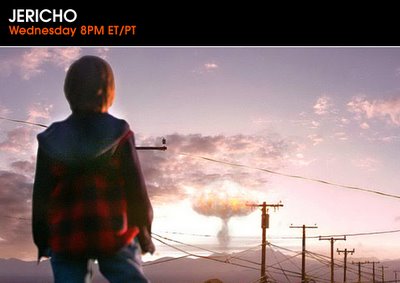 CBS’s Jericho—a kind of Red Dawn (a film me and my college mates feared would play out in the streets of our small college town) meets The Day After (another film we found particularly terrifying in that our college was in Kansas, where the film was set)—premiered Saturday night, and (while it stretches credibility) has me interested enough to give it a Season Pass.
CBS’s Jericho—a kind of Red Dawn (a film me and my college mates feared would play out in the streets of our small college town) meets The Day After (another film we found particularly terrifying in that our college was in Kansas, where the film was set)—premiered Saturday night, and (while it stretches credibility) has me interested enough to give it a Season Pass.The series is centered in a “quiet and peaceful” small Kansas town of the same name, which is “plunged into social, psychological and physical chaos” when “a baffling explosion occurs in the distance.” In the first episode, the residents see a mushroom cloud rising over the very distant Denver area and later deduce (from a cut-off answering machine message) that something similar has happened in Atlanta. Phone, television, and radio contact are cut off—the townsfolks are in the dark (literally, when the sun goes down). The towns good-intentioned but embattled Mayor struggles to provide leadership and pull the town together as they try to figure out what is going on.
 The plot’s intriguing (and definately plays to those college day fears), but there are other qualities that draw me to the series—especially how the show’s main characters form a kind of Prodigal Son Parable with a twist. Thirty-four year-old (and main character) Jake Green returns to Jericho after a five-year absence (the explanation for which he gives different answers each time he’s asked to explain). Obviously burdened but good-hearted, he's come back to pay respects to his recently deceased grandfather and seek restoration between he and his father as well as collect his inheritance, the reason for which is known only to his mom and him (but is alluded to as well-intentioned) . Jake’s brother, Eric, is the quintessential elder brother of the Parable: well-dressed, responsible and, while he obviously loves Jake, resentful of his brother’s return.
The plot’s intriguing (and definately plays to those college day fears), but there are other qualities that draw me to the series—especially how the show’s main characters form a kind of Prodigal Son Parable with a twist. Thirty-four year-old (and main character) Jake Green returns to Jericho after a five-year absence (the explanation for which he gives different answers each time he’s asked to explain). Obviously burdened but good-hearted, he's come back to pay respects to his recently deceased grandfather and seek restoration between he and his father as well as collect his inheritance, the reason for which is known only to his mom and him (but is alluded to as well-intentioned) . Jake’s brother, Eric, is the quintessential elder brother of the Parable: well-dressed, responsible and, while he obviously loves Jake, resentful of his brother’s return.But there are a couple of twists in the Parable, the first one in that the father is not waiting at the gates to welcome his son back into the fold. There’s obvious tension between Jake and his father (and also Jericho’s mayor), who is struggling with obvious issues of disappointment, judgment and anger at his son. In the first episode, this twist in the Parable’s form was mostly played out in a living room scene, where Jake is talking with his family right after he drives into Jericho. He tells his dad he needs his inheritance and his father immediately balks. Jake explains that he made “restitution” (for what, however, we viewers are left in the dark), but the response of his older brother and father are not ones of grace, forgiveness or love in the Parable. In fact, there’s even an issue of “law” playing out, in that as Jake’s father walks out of the room in anger, Jake calls out that if he can’t talk to his father can he at least “talk to my Mayor” (a symbol of an upholder of the law).
At this point, I think we’re seeing Jesus’ Parable the way the crowds in Jesus’ day might have expected it to play out. A son who goes away, dishonors his family and squanders his potential deserves to be met with punishment, skepticism, rules and penance even if he’s realized the error of his ways—all aspects associated with life under the Law. But with his Parable, Jesus (among other things) reveals that it’s not about living up to the Law. Instead, it’s about who God is and what he’s like: a God that loves us so much that he waits eagerly for our return, who longs to lavish his love upon us if we would but choose to come home—no matter what we’ve done, what Law we’ve broken or how we’ve acted. This scene, however, lets the Parable play out in the form the crowd in Jesus’ day (and ours, if we’re honest) might expect. Like the Prodigal, Jake comes back to make restitution without expectation to be welcomed back. But, unlike the Parable, this son’s expectations are right; he encounters, as expected, a rule of Law rather than grace and love.
But there’s another twist to the Parable’s form. While the father isn’t standing at the gates waiting for his son’s return (though I suspect he longs to), the mother is: the unconditional love and grace of the Parable’s father is present in her. She not only displays love and grace towards Jake but towards her other son, her husband and the people she encounters throughout the episode. She is wise, honest, smart and loving even as she sees each character’s weaknesses among their strengths: a combination that the Parable’s father displays as well.
So, it will be interesting to see how the Parable’s twists play out in future episodes—interesting enough to keep me watching, anyway.
(Images: CBS) jerichoctgy